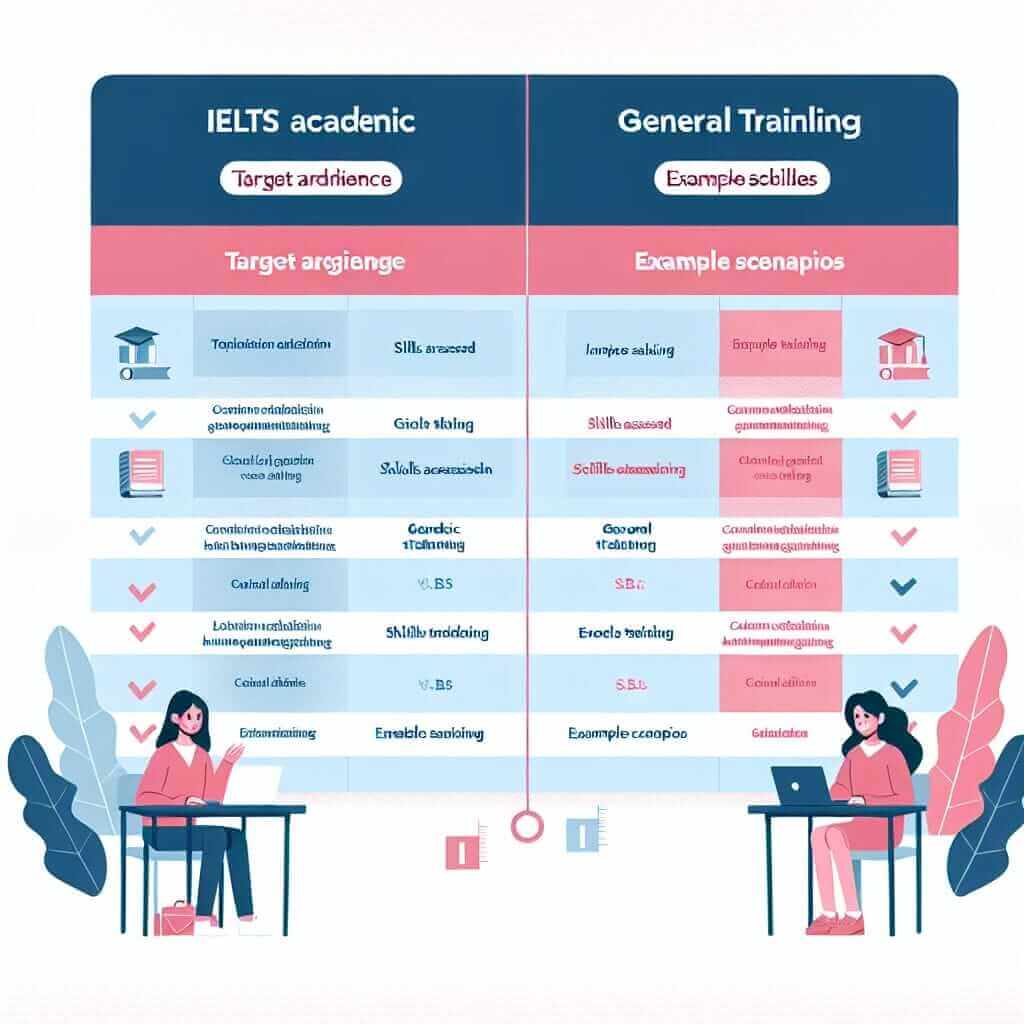The International English Language Testing System, or IELTS, is a globally recognized English proficiency test. Many people are unaware that there are two types of IELTS exams: IELTS Academic and IELTS General Training (GT). Choosing the right test is crucial for your success, as each caters to different purposes.
IELTS Academic vs. IELTS GT: Key Differences
The core difference lies in their intended audiences and assessed skills. Here’s a breakdown:
1. IELTS Academic
This test is designed for those planning to:
- Pursue higher education (undergraduate or postgraduate) at an English-speaking university.
- Register with a professional body.
- Migrate to an English-speaking country (for professional registration).
Focus: Academic IELTS assesses your English language abilities required for an academic environment. This involves understanding and using academic vocabulary, analysing complex data, and writing formally structured essays.
2. IELTS General Training (GT)
This test is suitable for individuals seeking:
- Migration to an English-speaking country (Australia, Canada, New Zealand, UK).
- Vocational training or work experience in an English-speaking environment.
- Secondary education in an English-speaking country.
Focus: IELTS GT focuses on evaluating your everyday English language skills necessary for social and workplace situations. It emphasizes practical communication skills, such as understanding casual conversations, writing letters or emails, and comprehending general texts.
Illustrative Examples
Let’s visualize the differences through examples:
| Feature | IELTS Academic | IELTS GT |
|---|---|---|
| Reading | Excerpts from academic journals, books, and articles. | Texts from newspapers, magazines, advertisements, and workplace documents. |
| Writing Task 1 | Describing and analyzing visual data (graphs, charts, diagrams). | Writing a letter or email in a personal, semi-formal, or formal style. |
| Writing Task 2 | Essay discussing a given academic topic. | Essay addressing a social or general issue. |

Applying the Knowledge to Real IELTS Tests
Listening:
Both tests assess your listening comprehension through recordings of conversations and monologues. However, the contexts differ slightly:
- Academic: Lectures, academic discussions, student interactions.
- GT: Everyday conversations, social situations, workplace dialogues.
Example: An Academic listening test might include a lecture on renewable energy sources, while a GT test might feature a conversation at a travel agency.
Speaking:
Both tests evaluate your spoken English through a face-to-face interview. However, the topics and expectations align with the test type:
- Academic: Discussing academic topics, expressing opinions, providing reasoned arguments.
- GT: Describing experiences, sharing opinions on everyday matters, demonstrating social language skills.
Example: An Academic speaking test might involve discussing the importance of historical preservation, while a GT test might ask about your hobbies and interests.
Common Mistakes and How to Avoid Them
-
Choosing the wrong test type: Carefully consider your purpose and the requirements of the institution or organization you’re applying to. Research thoroughly and seek guidance if needed.
-
Underestimating the importance of vocabulary: Both tests require a strong vocabulary, but the focus varies. Academic IELTS emphasizes academic vocabulary, while GT focuses on everyday and workplace language.
-
Neglecting specific skills: Each test assesses distinct skills. For instance, Academic Writing Task 1 requires data interpretation, while GT Writing Task 1 emphasizes letter writing. Tailor your preparation accordingly.
Tips for Effective Preparation
-
Identify your strengths and weaknesses: Take practice tests for both Academic and GT to gauge your performance and determine which areas need improvement.
-
Utilize official IELTS resources: Familiarize yourself with the test format, question types, and marking criteria using official IELTS preparation materials.
-
Develop a structured study plan: Allocate dedicated time to each skill (listening, reading, writing, speaking) and track your progress consistently.
-
Seek expert guidance: Consider enrolling in an IELTS preparation course or seeking feedback from experienced IELTS tutors to refine your skills and boost your confidence.
Conclusion
Understanding the distinctions between IELTS Academic and General Training is paramount for achieving your desired scores and fulfilling your academic or professional aspirations. By choosing the right test, preparing effectively, and focusing on the specific skills assessed, you can confidently approach the IELTS exam and unlock a world of opportunities.